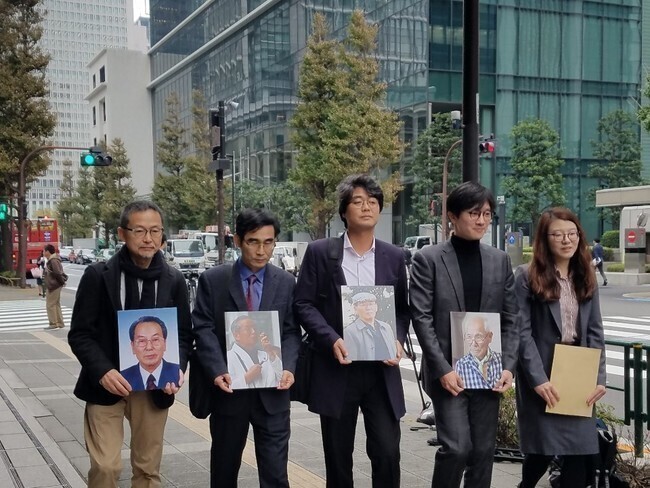hankyoreh
Links to other country sites 다른 나라 사이트 링크
Nippon Steel announces plan to immediately appeal seizure of assets

After a South Korean court verified service of process for the seizure of Nippon Steel’s assets through public notification on Aug. 4, the company announced that it plans to immediately appeal the seizure. Nippon Steel was ordered by the South Korean Supreme Court to pay damages to the victims of forced labor during Japan’s colonial occupation of the Korean Peninsula.
Nippon Steel announced its plan to appeal in an Aug. 4 statement, the Yomiuri Shimbun reported. “Our understanding is that the issue of labor conscripts was completely and finally resolved through the economic cooperation and claims agreement concluded by South Korea and Japan [in 1965],” the company said in its statement.
After Nippon Steel dragged out the legal process for a year and five months by refusing to accept the asset seizure service documents, the Pohang Branch of the Daegu District Court decided in June that it would accept service by notification in lieu of actually delivering the documents to the company. In line with that decision, the seizure order took effect on Aug. 4, giving the court the authority to liquidate Nippon Steel’s South Korean stock at any time henceforth.
Nippon Steel holds 81,075 shares (worth 405.37 million won [US$341,020] at 5,000 won [US$4.21] per share) in PNR, a joint venture with POSCO established in January 2008. By immediately appealing the court’s ruling, Nippon Steel can legally suspend the liquidation. On appeal, Nippon Steel’s objection could be dismissed or the lower court’s decision overruled.
Back in June 2012, one month after South Korea’s Supreme Court remanded the case to a lower court and instructed it to side with the plaintiffs, Soichiro Sakuma, a senior executive at Nippon Steel, told the company’s stockholders that the company would be obliged to obey the law, suggesting that it was willing to accept a court order to compensate the victims. But since the Supreme Court wrapped up the case in favor of the plaintiffs in 2018, Nippon Steel has stayed in lockstep with Japanese Prime Minister Shinzo Abe, who regards the Supreme Court’s ruling as unacceptable.
Japanese cabinet members hint at retaliatory measures
Japanese cabinet members hinted on Tuesday that the liquidation of Nippon Steel’s assets would force Japan to take retaliatory measures. “We will remain in close contact with the company in question and will respond firmly while considering several options for protecting the legitimate economic activity of Japanese companies,” Chief Cabinet Secretary Yoshihide Suga said during the daily press briefing that morning.
“South Korea’s actions go against international norms. The progression of events suggest a growing likelihood that we [Japan] will be forced to take action,” said Deputy Prime Minister Taro Aso.
Japan’s retaliatory measures could include recalling its ambassador to South Korea, limiting the issuance of visas to South Koreans, raising tariffs on South Korean products, tightening rules for exporting Japanese products to South Korea, imposing financial sanctions, and bringing a lawsuit before the International Court of Justice.
A group of conservative lawmakers in the Liberal Democratic Party called the Conservative Solidarity Association submitted a resolution to the Japanese government on Aug. 4 that substantial sanctions should be immediately imposed on the South Korean government if Nippon Steel’s assets are liquidated.
By Shin Gi-sub, senior staff writer, and Cho Ki-weon, Tokyo correspondent
Please direct comments or questions to [english@hani.co.kr]

Editorial・opinion
![[Editorial] Does Yoon think the Korean public is wrong? [Editorial] Does Yoon think the Korean public is wrong?](https://flexible.img.hani.co.kr/flexible/normal/500/300/imgdb/original/2024/0417/8517133419684774.jpg) [Editorial] Does Yoon think the Korean public is wrong?
[Editorial] Does Yoon think the Korean public is wrong?![[Editorial] As it bolsters its alliance with US, Japan must be accountable for past [Editorial] As it bolsters its alliance with US, Japan must be accountable for past](https://flexible.img.hani.co.kr/flexible/normal/500/300/imgdb/original/2024/0417/6817133413968321.jpg) [Editorial] As it bolsters its alliance with US, Japan must be accountable for past
[Editorial] As it bolsters its alliance with US, Japan must be accountable for past- [Guest essay] Amending the Constitution is Yoon’s key to leaving office in public’s good graces
- [Editorial] 10 years on, lessons of Sewol tragedy must never be forgotten
- [Column] A death blow to Korea’s prosecutor politics
- [Correspondent’s column] The US and the end of Japanese pacifism
- [Guest essay] How Korea turned its trainee doctors into monsters
- [Guest essay] As someone who helped forge Seoul-Moscow ties, their status today troubles me
- [Editorial] Koreans sent a loud and clear message to Yoon
- [Column] In Korea’s midterm elections, it’s time for accountability
Most viewed articles
- 1[Column] The clock is ticking for Korea’s first lady
- 2[Editorial] When the choice is kids or career, Korea will never overcome birth rate woes
- 3[Guest essay] How Korea turned its trainee doctors into monsters
- 4[Editorial] As it bolsters its alliance with US, Japan must be accountable for past
- 5S. Korea, Japan reaffirm commitment to strengthening trilateral ties with US
- 6Korea, Japan jointly vow response to FX volatility as currencies tumble
- 7Gangnam murderer says he killed “because women have always ignored me”
- 8Japan officially says compensation of Korean forced laborers isn’t its responsibility
- 9[News analysis] After elections, prosecutorial reform will likely make legislative agenda
- 10‘Right direction’: After judgment day from voters, Yoon shrugs off calls for change